Across our network of schools, STEAM classes, activities, and initiatives are a significant part of what make our schools the high achieving and innovative campuses they are. At BASIS Bilingual School Shenzhen, this inspired a fun and educational event–a three-day Science Carnival at the end of October 2021 for all students in primary and middle school. Hosted in collaboration with leading technology company DJI, BASIS Bilingual School Shenzhen staff and faculty led students in exciting robotics competitions and piloting drones through circuits. Students engaged in hands on activities with cutting-edge technology, laying the foundation for future study and competitions in robotics.
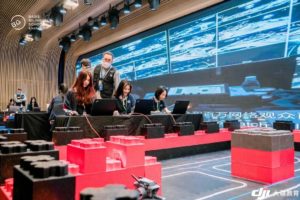
Our staff and faculty worked tirelessly to coordinate and produce this event, and it is just the beginning of their plans for the STEAM and robotics program at BASIS Bilingual School Shenzhen. Members of the team, teacher Shulin Li and Matthew Koo, chair of the ICT committee and STEAM, shared with us their inspiration and passion for this initiative, as well as continued STEAM activities throughout the school year.
What was the inspiration behind creating this event?
Matthew Koo:
As a team, we felt that we wanted students to see how they could apply the knowledge they learned in school into various sectors of technology. When we saw an opportunity to work with DJI, a leading competitor in the field of robotics, we knew instantly it was something we wanted to do. We couldn’t be happier about how the carnival turned out!
Shulin Li:
The purpose of creating this event in our school is to give all students a relaxing and enjoyable tour in cutting-edge robotics with a good STEAM learning experience. By inviting DJI to our campus, we hope this event can enrich students’ learning experience, broaden their horizon, and inspire some of them to explore more in STEAM contexts. On the other side, through this event, we also want to attract, motivate, and engage more passionate and talented students in future robotics after school activities and competitions.
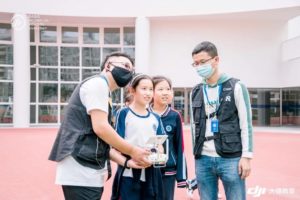
Have you been involved in similar initiatives and activities previously?
Matthew Koo:
For the past 2 years, I’ve been involved with the Nanshan Maker Faire here in Shenzhen that similarly promotes student creativity and innovation. The Maker Faire invites students from around the area to showcase their inventions, projects, and ideas to the general public. The Maker Faire has instilled love to thousands of young makers for all things STEM.
Shulin Li:
I have been involved in two Maker Faires previously in the United States. One was happening in the University of Pennsylvania campus; the other was initiated by CS4Philly Institute.
What was the students response to the event and activities?
Matthew Koo:
The students loved all parts of the carnival, especially the robot battleground where two teams of students were able to use DJI’s latest robots to duel it out on a large, customized battleground.
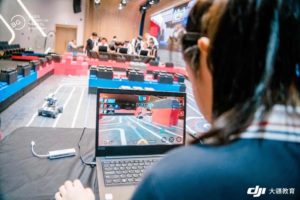
Shulin Li:
Students are quite excited about the event. The most popular activity is the RoboMaster S1; students are excited about the competition and some are pretty “addicted.” A Grade 6 student told me he bought 2 S1 robots for his younger brothers after the event. Most students wished they could participate for a longer time. Drone TT is favored by primary school students; they are very curious about the drone.
What outcomes were you looking to achieve with the students?
Matthew Koo:
We were hoping to expose students to the world of robotics and drones, inspiring some of them to perhaps develop a passion for the field of technology in the future. With technology becoming a larger part in today’s world, we felt that it was important for students to have opportunities experiencing all that it has to offer. With a number of students asking questions after the workshops and even more asking about the robotics and drone afterschool programs, we felt that we succeeded in achieving our goal.
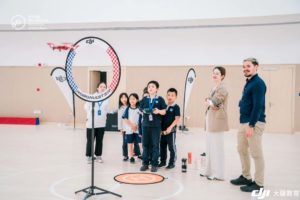
Shulin Li:
- Getting more knowledge about modern robots/drones
- Relaxing and having fun before the mid-term
- Building friendships with new classmates
- Fostering a love of STEAM/Robotics
- Engaging more students in robotics/drone after school activities (ASAs)
What was the most rewarding and enjoyable part of this event for you?
Matthew Koo:
The most rewarding part of this event was definitely seeing the excitement and anticipation of the students. Being involved in planning an event that made students from primary to middle school genuinely excited and wanting more is truly something special.
Shulin Li:
Students and teachers had a good time.
What are the plans to grow the robotics and STEAM program and offerings?
Shulin Li:
We are running a robotics ASA and a drone ASA recently. We will gradually get more budgets to upgrade kits and tools in the STEAM Lab. We are developing robotics and STEAM projects. Now, we are teaching a hardware computing lesson series for Grade 3, Grade 6, and Grade 9 students using micro:bits.
Matthew Koo:
We are looking forward in continuing what this event has started by offering a robotics and drone afterschool program for our students. As the year continues, we hope that we can create a few teams to compete in various competitions hosted by DJI and other robotics companies. As for our STEAM program, we are currently seeing where integration of robotics inside the classroom is possible, while also working on various collaborative projects that will help our students further connect their school studies with hands-on application.
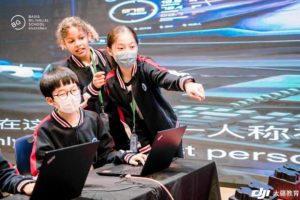
For more information about teaching with BASIS Bilingual School Shenzhen, visit our careers website.